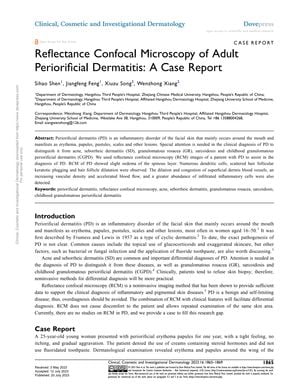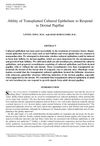Reflectance Confocal Microscopy of Adult Periorificial Dermatitis: A Case Report
July 2023
in “
Clinical, cosmetic and investigational dermatology
”
reflectance confocal microscopy periorificial dermatitis inflammatory facial skin disorder edema spinous layer dendritic cells keratotic plugging dilation of hair follicles dilation of blood vessels congestion of blood vessels superficial dermis vascular density accelerated blood flow inflammatory cells RCM PD skin inflammation swelling epidermis immune cells clogged pores enlarged hair follicles enlarged blood vessels blood vessel congestion upper skin layer increased blood vessels faster blood flow immune response cells

TLDR Reflectance confocal microscopy helped tell periorificial dermatitis apart from similar skin conditions.
Reflectance confocal microscopy (RCM) was utilized to assist in the diagnosis of periorificial dermatitis (PD), an inflammatory facial skin disorder. The RCM images revealed slight edema in the spinous layer, numerous dendritic cells, keratotic plugging and dilation of hair follicles, as well as dilation and congestion of blood vessels in the superficial dermis. Additionally, there was an observed increase in vascular density, accelerated blood flow, and a higher number of infiltrated inflammatory cells. These findings helped to differentiate PD from other similar dermatological conditions such as acne, seborrheic dermatitis, granulomatous rosacea, sarcoidosis, and childhood granulomatous periorificial dermatitis.

